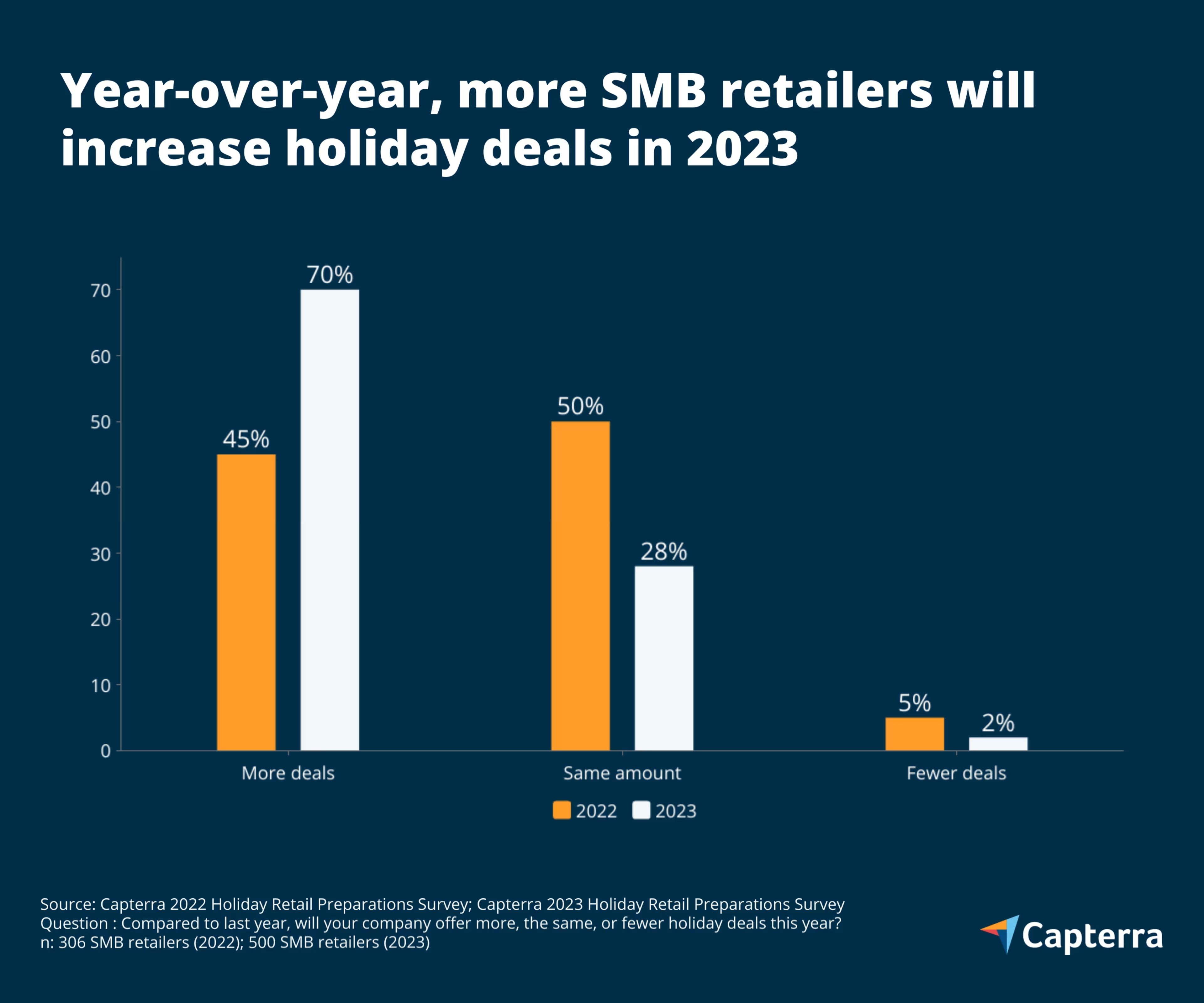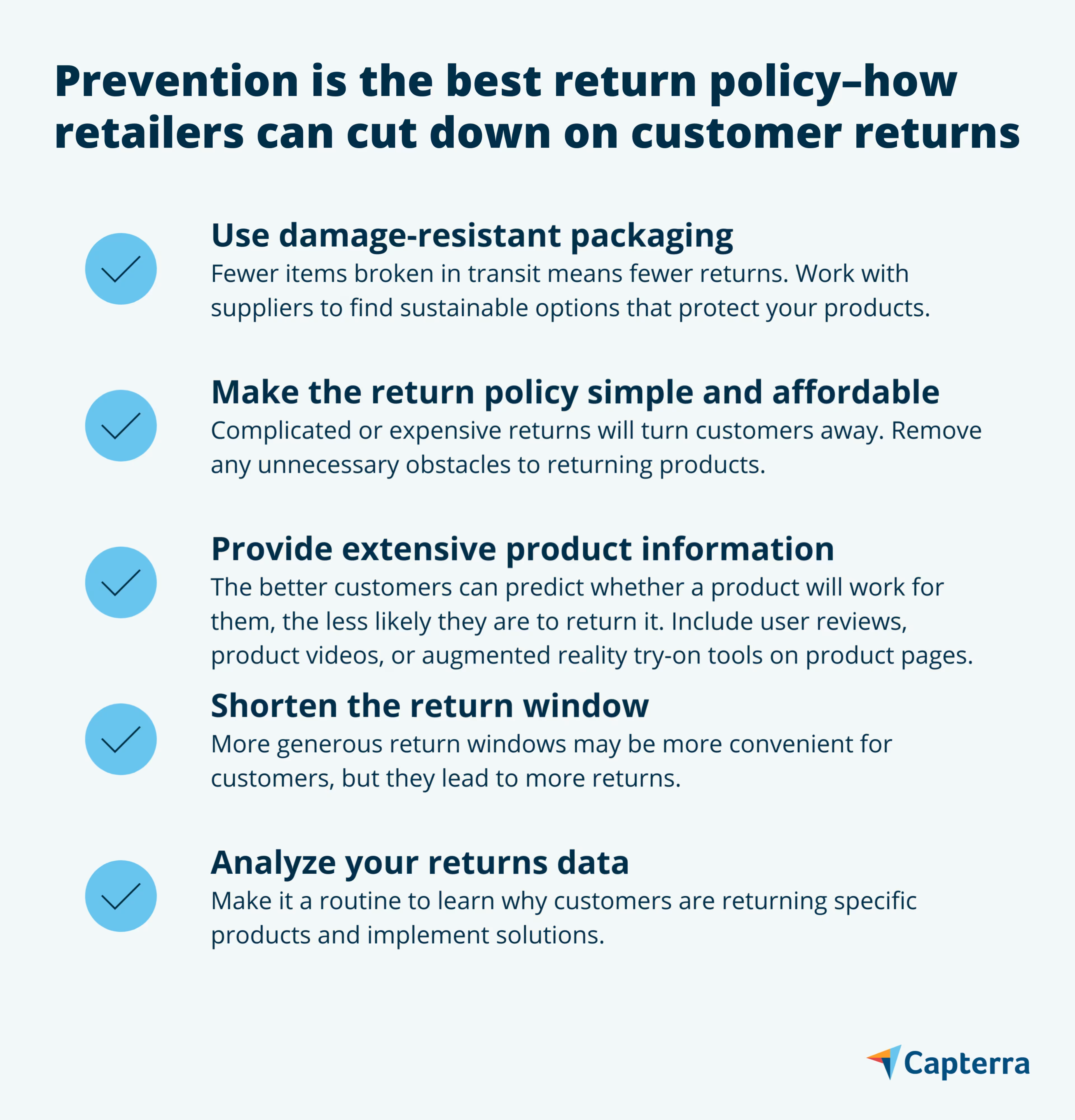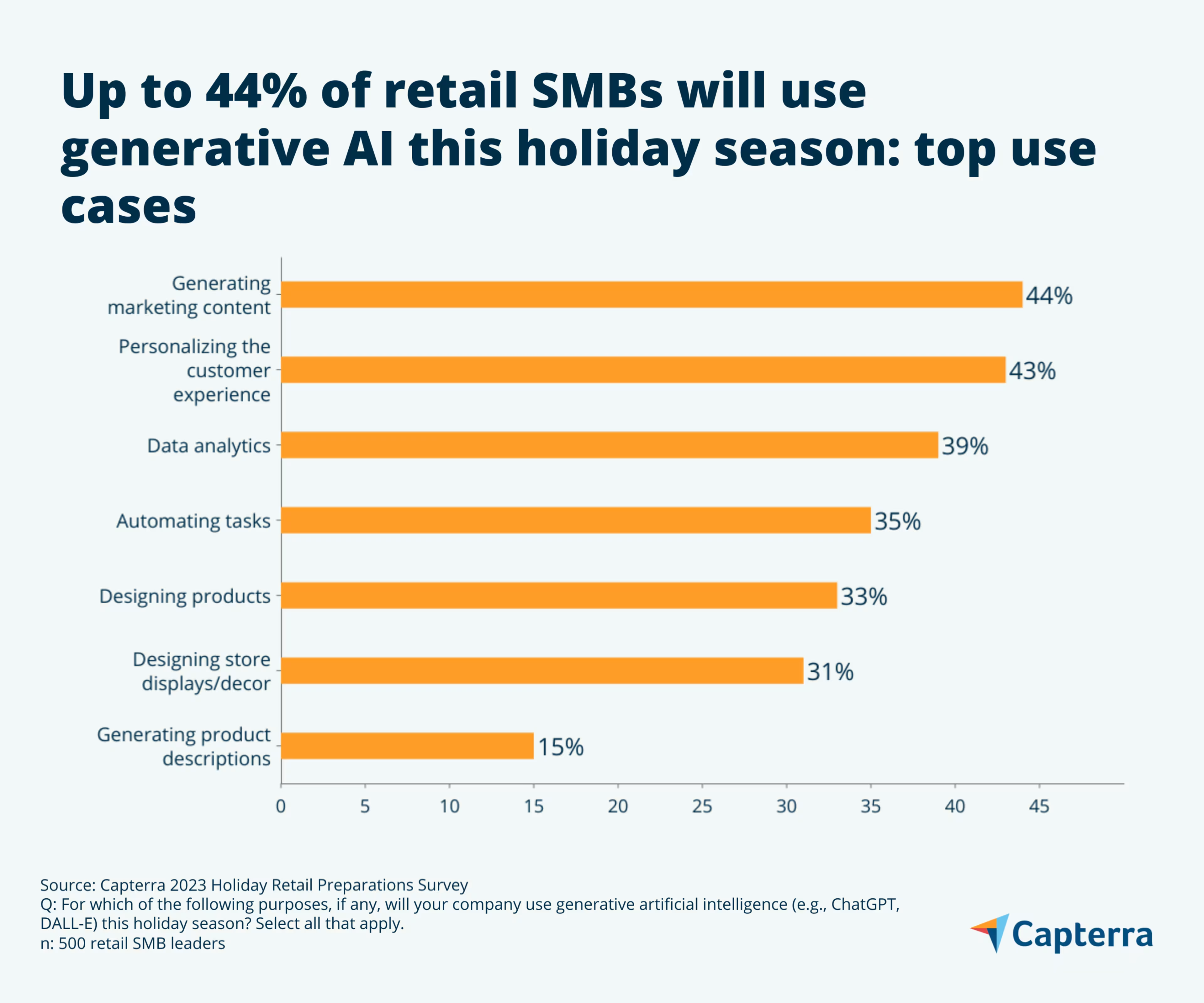Elevated logistics costs could take a bite out of SMB's holiday revenue.
According to Capterra's Annual Holiday Retail Preparations Survey, small to midsize retailers are looking forward to a profitable holiday season and plan to launch more deals even earlier than they did in 2022.* However, they also expect to deal with more returns than last year, and will lean on generative AI tools to add efficiency and personalization to their holiday strategies.
If you run a small to midsize retail business, there's still time before the holidays hit to sharpen your returns management strategy and automate workflows using AI. Act now, or you may be stuck dealing with the fallout as consumers spend—and second-guess—more this holiday season.
/ Key insights
70% of retail SMBs will offer more holiday deals this year than they did in 2022.
49% of retail SMBs will launch holiday deals by September.
Labor Day is quickly displacing Black Friday and Cyber Monday as the top-performing holiday sales event.
75% of retail SMBs expect more holiday season profits than in 2022, and 57% expect more returns.
44% of retail SMBs will use generative AI to support their holiday retail strategies.
Retailers will offer more deals even earlier than last year
Consumers can look forward to substantial savings this holiday season, as 70% of SMB retailers plan to offer more holiday deals in 2023 than they did in 2022. That's a significant increase from last year, when just 45% of retail SMBs pledged to increase holiday deals.

In addition to offering markdowns, coupons, and free shipping, SMBs will entice shoppers with exclusive deals for specific audiences, such as loyalty members or social media followers.
Nearly half of retailers will offer freebies this year, such as buy-one-get-one deals, reflecting the strategy many big-box stores will use to offload the overstock they accumulated in 2022.
While most SMBs didn't over-order holiday merchandise last year, they do tend to draw inspiration from retail giants when planning for the holiday season. That influence extends not just to which deals SMBs will offer, but when they offer them.
Labor Day is the new Black Friday, according to 53% of retail SMBs
SMB retailers have continued the trend of launching holiday deals further and further ahead of any actual winter holidays. Last year, 40% of surveyed retailers said they'd launch holiday deals by October. This year, 49% will have launched holiday deals by September, with 70% rolling out holiday deals before Halloween.
A handful of factors from the past few years play a role in SMB retailers' move to push shoppers into early buying:
The pandemic: In 2021, analysts predicted reduced consumer spending during the holidays, so big-box stores launched holiday deals in October.[1] Consumers shopped those early sales to avoid falling victim to stockouts resulting from persistent supply chain issues. The pattern of early holiday deals and shopping has continued since then.
Inflation: Consumers want to spread out their holiday purchases to soften the impact of higher prices at the end of the year. One way to do that is to buy holiday gifts during back-to-school sales.
Competition with Amazon: Amazon now holds two monumental sales events each year: Prime Day in July and Prime Big Deal Days in October. Big-box stores know that Prime Day doesn't just benefit Amazon—it generates above-average sales for online retailers across the board.[2] So they run counter-sales in the summer to get in on the action. If retailers want to compete with Amazon for early holiday shoppers, they'll now have to run their own sales in October as well.
Consumers want to buy experiences, not things: Analysts and big-box CEOs have blamed “revenge spending” on experiences, rather than products, for lower-than-expected earnings in recent quarters.[3] By extending the holiday shopping season, retailers have more chances to compete against flights, movies, concerts, and other events for consumers' year-end dollars.
Sooner has worked so far: September has dethroned November as the best-performing end-of-year sales event for many SMB retailers: 53% said Labor Day sales brought in the most revenue for their company last year, versus 44% who said Cyber Week (which includes Black Friday and Cyber Monday). For the past two years, roughly half of retailer SMBs have adjusted by ordering their holiday inventory early.
/ The bottom line
Early-bird holiday shopping is here to stay. SMBs can take a note from big-box companies by offering holiday merchandise online first, saving valuable shelf space for other products until it gets closer to the traditional peak holiday shopping period.
Retailers expect more traffic, profits, and returns
Despite signs of a stressed economy, retailers are optimistic about how they'll perform this holiday season. Well over three-quarters of eCommerce businesses expect a rise in web traffic to their company's online channels, and 71% of those with physical stores expect a jump in foot traffic. Overall, the majority of SMB retailers expect overall consumer spending and their own holiday season profits to rise year-over-year.
Extending the holiday shopping period could certainly help SMBs see gains this year, as consumers will have more opportunities to shop–especially during annual sales events that in the past have not featured holiday goods, such as the back-to-school shopping season or Labor Day sales.
But that success could also come with greater logistical hurdles as two of the biggest post-pandemic challenges intensify over the holidays: consumers' expectations for universal free shipping and a general rise in customer returns for online orders.[4]
During the pandemic, consumers grew accustomed to receiving free, fast shipping for most orders and returns, but even retail giants like Amazon are beginning to push back by raising free shipping thresholds and charging return fees.[5] For their part, most SMBs do plan to offer free shipping for all orders and returns. However, one-third will limit free shipping to qualifying orders, such as product bundles or orders placed during sales events.
Retailers will also need to focus on managing customer returns, as 57% of retail SMBs expect to receive more returns this holiday season compared to last year. Since the eCommerce boom of 2020, retailers have seen a dramatic increase in returns of products bought online. Though online sales have also risen, the influx in returns is still a costly problem for retailers, as it involves shipping, repackaging to resell, or disposal of returned merchandise.

Prevention is key when it comes to managing returns effectively. To curb the return rate, SMBs will try a few different strategies. Compared to last year,
41% will offer more products as final-sale items.
26% will shorten the time window for returns.
24% will charge more for shipping.
Olivia Montgomery, an associate principal analyst of supply chain at Capterra, notes that the best returns management plan is a returns prevention plan.
"Managing returns, also known as reverse logistics, in a way that recoups as much revenue as possible is crucial to today's retailers, and it starts with prevention. A few proactive steps can help cut down on the amount of returns to your company. Don't forget: Reverse logistics are becoming a branding concern as much as a financial one. How you manage returned items affects whether your customers view your company as environmentally responsible, which is a growing consumer concern."
Olivia Montgomery
Associate principal analyst of supply chain at Capterra
/ The bottom line
SMBs need to prepare for a larger influx of holiday returns this year. Taking preventive action with product descriptions and using thoughtful packaging can help reduce returns—so can having the right returns management software.
Retailers will use generative AI to support marketing and customer experience
In the retail and marketing industries, using AI tools is quickly becoming the norm. Some of retailers' highest priorities this holiday season include personalizing the customer experience, increasing automation, and speeding up workflows–tasks that generative AI was built for. As many as 44% of SMB retailers will use generative AI tools, such as ChatGPT, in their holiday strategy, primarily for creating marketing content, supporting customer experiences, and improving data analytics.

Generative AI is a valuable asset in cutting down on returns because it can guide online customers to products that are better suited to their individual size and preferences and are therefore less likely to be returned. For example, augmented reality try-on software allows customers to preview what a new lipstick shade will look with their complexion, while algorithm-driven sizing tools can match customers to their next pair of perfectly-fit jeans.
What's more, AI tools can offer customers personalized suggestions of other products to browse, based on their preferences and those of like-minded customers. Using a generative AI writing tool to create richer product descriptions to appeal to your specific audience can help you make sales that will satisfy your customers and result in fewer returns.
SMBs aren't turning to AI tools just for the convenience they offer—they're also looking to gain a foothold in next-generation web search as generative AI transforms how shoppers browse products online. In fact, 73% are concerned that small businesses will be drowned out by large corporations as online product searches migrate from search engines to generative AI chatbots and search tools, and they hope early adoption will keep them in the game.
Recent Capterra research indicates that there may be a hidden benefit to adopting AI tools: employee retention. Meghan Bazaman, a senior analyst of marketing at Capterra, says that a majority (83%) of marketers have already incorporated AI marketing tools into their day-to-day work, and over two-thirds believe learning how to use AI software is essential to staying competitive in their field.
"Marketers anticipate that AI will provide a range of benefits, particularly when it comes to efficiency and productivity improvements—but given the importance of soft skills, they're not worried about job security. In fact, nearly half of surveyed marketers expect AI to ultimately create more jobs than it will eliminate. SMBs need to incorporate AI-specific training into their development plans so their employees don't fall behind–or leave for a company that does provide formal AI training."


Meghan Bazaman
Senior analyst of marketing at Capterra
/ The bottom line
Using generative AI tools can help SMB retailers chip away at customer returns while supporting employee creativity, productivity, and professional development. It’s a good idea for SMBs to explore the benefits of AI as generative AI transforms online shopping and digital marketing.
Don't wait until it's too late
Your company may be excited to take advantage of an extended holiday shopping season with higher projected revenue, plenty of deals, and support from recent AI software investments. But keep in mind that even a small increase in returns can seriously bite into year-end revenue.
Taking preventive action now is crucial—don't wait to determine where you have gaps in returns management, so you can find the right solutions to patch them up before the holiday season reaches its peak.
There’s still time to set your business up for a successful 2023 holiday shopping season. Take a moment now to revamp your return policy and consider your options for returns management software and AI tools to create content and personalized customer experiences.
Looking for an expert to help you get started with AI? Browse our list of top AI service providers to discover AI solutions for your business.
